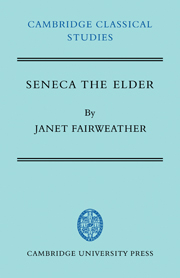Book contents
- Frontmatter
- Contents
- Preface
- Abbreviations
- PART I THE PLACE OF SENECA THE ELDER IN LITERARY HISTORY
- PART II SENECA THE ELDER ON THE HISTORY OF ELOQUENCE
- PART III FIVE ASPECTS OF DECLAMATION: THE ELDER SENECA'S EVIDENCE
- 1 Inventio
- 2 Dispositio
- 3 Elocutio
- 4 Memoria
- 5 Actio
- PART IV THE PLACE OF EARLY IMPERIAL DECLAMATION IN LITERARY HISTORY: THE ELDER SENECA'S EVIDENCE
- Indexes
- Frontmatter
- Contents
- Preface
- Abbreviations
- PART I THE PLACE OF SENECA THE ELDER IN LITERARY HISTORY
- PART II SENECA THE ELDER ON THE HISTORY OF ELOQUENCE
- PART III FIVE ASPECTS OF DECLAMATION: THE ELDER SENECA'S EVIDENCE
- 1 Inventio
- 2 Dispositio
- 3 Elocutio
- 4 Memoria
- 5 Actio
- PART IV THE PLACE OF EARLY IMPERIAL DECLAMATION IN LITERARY HISTORY: THE ELDER SENECA'S EVIDENCE
- Indexes
Summary
Omnia ergo habebat [sc. Cassius Severus], quae ilium, ut bene declamaret, instruerent: phrasin non vulgarem nee sordidam, sed electam, genus dicendi non remissum aut languidum, sed ardens et concitatum, non lentas nee vacuas explicationes, sed plus sensuum quam verborum habentes …
(Contr. III pr. 7)PHRASIS ELECTA
Tastefulness in the choice of diction, in the elder Seneca's opinion, was one of the factors which ought to make for a good declaimer. It emerges from his reports of critical discussions about declamation that the scholastics of his time hedged themselves around with all manner of prohibitions about diction. It was not only the use of barbarisms and obscenities that was forbidden: any word with mundane associations, any archaism or neologism, was liable to be scrutinized with varying degrees of pedantry. Seneca tells us much of interest about these prohibitions, while himself adopting a fairly tolerant attitude towards all but the most monstrous breaches of the rules.
Even over the matter of barbarisms we have to distinguish between Seneca's attitudes and those of the stricter critics of his time. Seneca did not, of course, positively advocate barbarism, but he had nothing disparaging to say about the diction of Latro, of whom Messala, Latini … sermonis observator diligentissimus, once said on hearing him declaim, sua lingua disertus est (Contr. II.4.8). Yet he was evidently not completely deaf to the strangeness, by metropolitan standards, of Spanish Latin: at any rate he was reminded by some passages in Sextilius Ena's poetry of Cicero's reference in the Pro Archia to the rich and foreign resonances of Corduban poetry (Suas. 6.27).
- Type
- Chapter
- Information
- Seneca the Elder , pp. 190 - 227Publisher: Cambridge University PressPrint publication year: 1981



